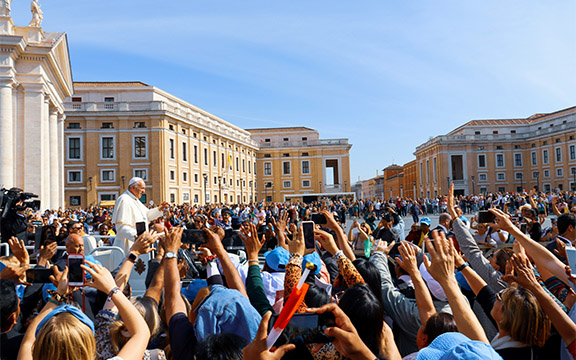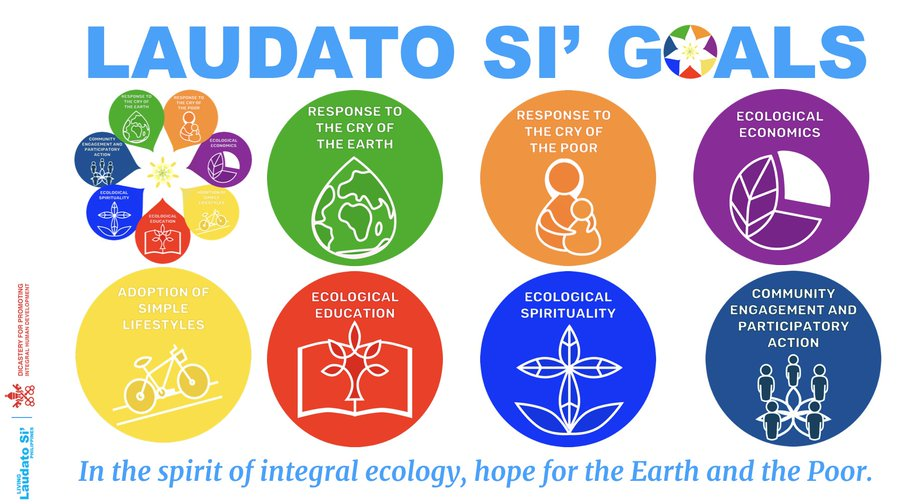
Photo of Pope Francis in St. Peter’s Square by Agatha Depine, courtesy of Unsplash.
Before my ordination into the priesthood in the Episcopal Church, I had this powerful dream. In the dream, I was visiting Pope Francis. We met. He welcomed me. There was a sense of connection, of communion. Then he gave me—or instructed his assistant to give me—a bunch of rosaries. And he said, “These are the rosaries for your people, the ones you will be ministering to. Keep them. Because when they make me a saint, they will become relics.”
I woke up from that dream feeling like it wasn’t just a dream. It felt like an encounter. A visitation. Something real had happened. I recall that dream now, after learning that Pope Francis has passed. He inspired me deeply. I didn’t always agree with all of his views. But his presence, his care, moved me deeply.
One of the things I appreciated most was his vision of the Church—not just as a self-referential institution clinging to its past glories, not as a kind of spiritual empire more concerned with power than with people—but as a field hospital: a place where those wounded by life could come to be restored, to be healed, to be loved back into life and newness. He once said the Church’s first task is to bind wounds. The rest can follow.
Another defining mark of his ministry was his call for priests to “smell like the sheep.” This call to simplicity. This call to return to the basics. To leave behind the things that so many of us in clerical roles, regardless of denomination, can get caught up in: status, ornamentation, self-importance. In his 2013 Chrism Mass homily, he said, “This is what I am asking you—be shepherds with the smell of the sheep, so that people can sense that the priest is not just a bureaucrat or a functionary, but a shepherd in the midst of his flock.” He reminded us that ministry must begin not from above or apart, but with the people—with listening, with their problems, with openness, with closeness.
He also called us to live our spirituality in the context of the cry of the poor and the cry of the earth. Here, of course, are echoes of liberation theology—and of the phrase originally coined by Leonardo Boff, the Brazilian theologian and former Franciscan who was silenced by the Vatican during one of the previous papacies. In Laudato Si’, which Bill McKibben has called “the most important document of his papacy, and arguably the most important piece of writing so far this millennium.”
Pope Francis brought these two cries together—drawing from the traditions of liberation theology and creation spirituality. He insisted that our prayers are not meant to catapult us into a detached spiritual space. Our encounter with God isn’t real unless it includes the poor—including our mother, our sister, the earth. Unless it sends us back into the heart of the world’s suffering, where we are invited to become God’s partners in transfiguring the world.
Equally central to his life was what he called la revolución de la ternura—the revolution

The heart of Pope Francis exemplified by Laudato Si’.
of tenderness. That, to me, speaks to the essence of who he was. A man of open-heartedness. Of gentleness. Someone who invited us to let the world touch us. Even break us open. To walk through life without all our protections. Just human to human. Knowing that regardless of our class, race, gender, or background—we belong to each other.
And when we remember that, something of God becomes present. A love is felt. A transfiguring power is invited in. As he wrote in Let Us Dream: “It is better to live a shorter life serving others than a longer one resisting that call.”
His deep commitment to interfaith friendship and solidarity also stood out. I remember his first trip to the Holy Land. He invited his old friends from Buenos Aires—a rabbi and an imam—to go with him. They traveled together, as companions. A simple gesture, but a powerful witness to the hope that the Holy Land can be a place of shared belonging—for all those whose faith and history are rooted there.
And along with all this openness and compassion, he carried a prophetic fire. He could look powerful people in the eye and confront them—about the arms trade, about war, about systems that generate poverty and exclusion. In Laudato Si’, he wrote that the earth “is beginning to look more and more like an immense pile of filth.” He denounced what he called “an economy that kills”—a system that discards both people and creation in pursuit of profit. He exposed the throwaway culture and the globalization of indifference as moral failures, and named indifference itself as one of the greatest threats to our shared future. He insisted that “we can no longer turn our backs on reality,” and called the Church—and all of us—to a radical reorientation toward justice, compassion, and care for our common home.
So today, we are called to draw on all of that—his tenderness, his courage, his simplicity, his vision—as we continue the work. Pope Francis was beloved by the poor, the unhoused, the struggling, the excluded. I remember some years ago, right after his visit to New York City, I was with our community offering food and presence to those experiencing homelessness near Madison Square Garden. A friend who was living on the street approached us. She held up a rose. “Look at this rose,” she said. At first, I thought it was just a rose. But then she explained: “He was here yesterday. I waited, hoping I’d see him, but I didn’t. But the guards saw me standing there, waiting. And they gave me this. This is the rose from the altar.” She held it like a relic. “So now,” she said, “when I walk with it, I feel like I’m carrying his presence.”
That’s what Pope Francis meant to her—and to so many others. A presence. A witness. A fragrance of compassion and tenderness that lingers in the streets of suffering. She said, “Even though I feel so alone at times, I am never alone.” And that’s how I feel today too.
About the Author:
 Father Adam Bucko has been a committed voice in the movement for the renewal of Christian Contemplative Spirituality and the growing New Monastic movement. At the start of his spiritual journey he immersed himself in Yoga and interfaith teachings while living at Satchidananda Ashram–Yogaville in Virginia. He has taught engaged contemplative spirituality in Europe and the United States, and has authored Let Your Heartbreak be Your Guide: Lessons in Engaged Contemplation and co-authored Occupy Spirituality: A Radical Vision for a New Generation, and The New Monasticism: An Interspiritual Manifesto for Contemplative Living.
Father Adam Bucko has been a committed voice in the movement for the renewal of Christian Contemplative Spirituality and the growing New Monastic movement. At the start of his spiritual journey he immersed himself in Yoga and interfaith teachings while living at Satchidananda Ashram–Yogaville in Virginia. He has taught engaged contemplative spirituality in Europe and the United States, and has authored Let Your Heartbreak be Your Guide: Lessons in Engaged Contemplation and co-authored Occupy Spirituality: A Radical Vision for a New Generation, and The New Monasticism: An Interspiritual Manifesto for Contemplative Living.

